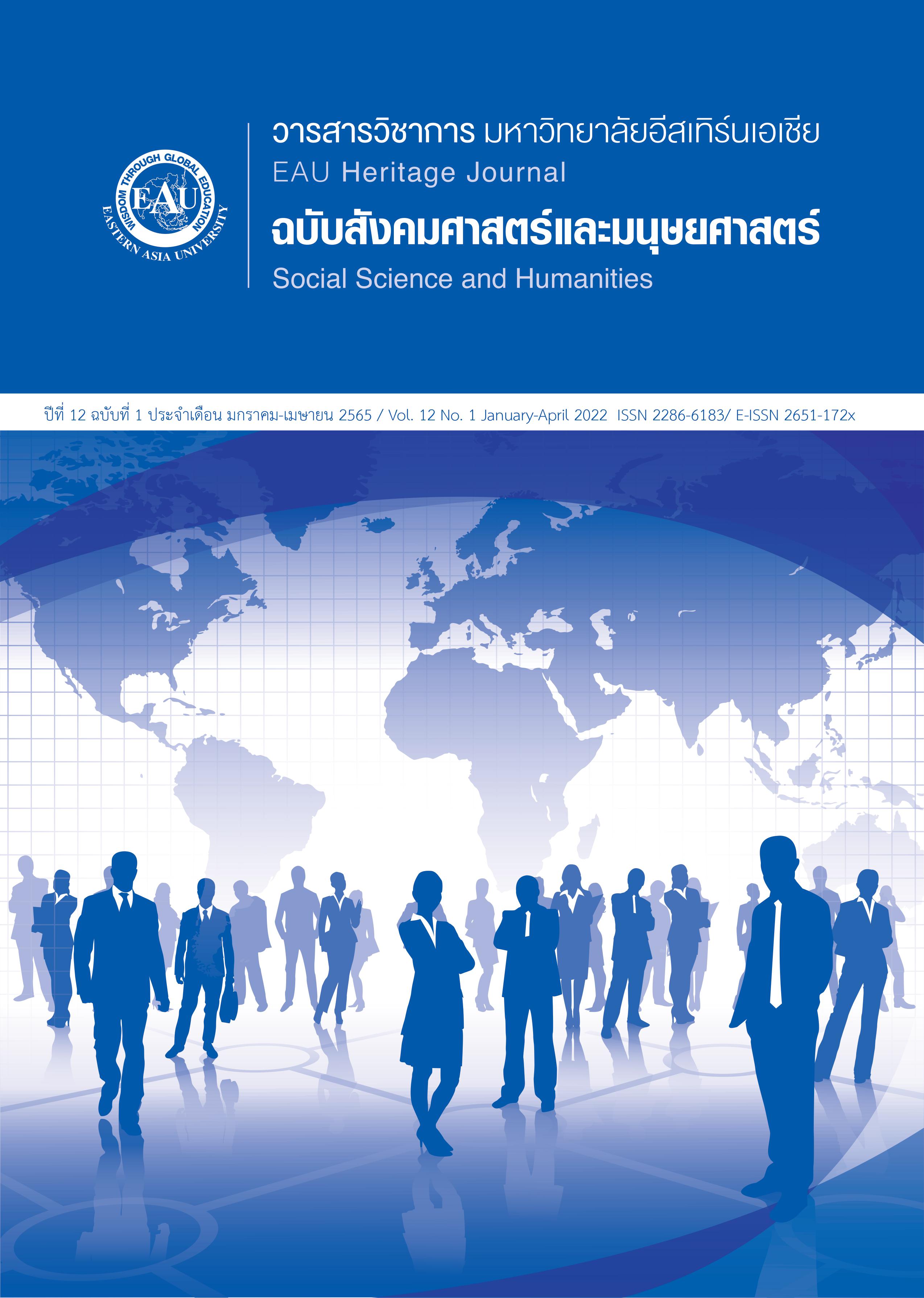Eco-Agriculture Tourism Management by the Community Network in Chomphu District, Noen Maprang, Phitsanulok
Keywords:
Management, Eco-Agriculture Tourism, Chomphu Community NetworkAbstract
This research studied about eco-agriculture tourism management by Chomphu community network, Noen Maprang district, Phitsanulok, the objectives of this research were 1) to develop products of travel from eco-agricultural resources of Chomphu community and 2) to develop the performance in eco-agriculture tourism management by Chomphu. This research was conducted with community-based research (CBR) process and emphasized on the participation of researcher team, working with farmer networks and related parties including the public private sectors, public sectors and academicians. The research area was tourist attractions in Chomphu, Noen Maprang district, Phitsanulok. The research instruments were questionnaires, observation record form and focus group for collecting data. The data was analyzed by using frequency, percentage, average, standard deviation, and using content analysis for qualitative data.
The results showed that the community researcher team can develop tourism products from the eco-agricultural resources of Chomphu community, Noen Maprang district, Phitsanulok. It was included in 3 products: tourism product: "Silawaree of Chomphu in Thung Salaeng Luang", "Non Son" In the middle of Thung Salaeng Luang and "Top View of Chomphu-history of Rak Thai". From studying behaviors and needs of tourists, we can make the difference by designing products based on the needs of tourists and make a market for communication and development of eco-agriculture tourism management performance in Chomphu community. The community business plan was form tour studying, management training, the researchers were be able to allocate duties and responsibilities and benefits thoroughly. Money allocation was based on the amount of time dedicated to tourism activities fairly and using system management in trip of "Tieaw Thai Pai Chomphu" of tourism club by the community that was involved in the management. Establishing an eco-agriculture tourism cooperation network with farmer networks was related public sectors, private sectors and academicians. Especially, Thung Salaeng Luang National Park which is the main area in tourism and mass media and entrepreneur were a network of collaboration to develop the area of Chomphu into a popular tourist destination.
References
แพร่ระบาดของโรคติดเชื้อไวรัสโคโรนา 2019 (COVID-19). ค้นจาก https://drive.google.com/file/d/1I5zqUvfFwN-yAaO6L10LqgJagAolSeCI/view
ขวัญชนก พุทธจันทร์. (2564). Agritourism (การท่องเที่ยวเชิงเกษตร). ค้นจาก
https://www.lib.ku.ac.th/2019/index.php/covid-19/1090-agritourism
คมสัน สุริยะ. (2552). สร้างการท่องเที่ยวชุมชนอย่างไร. ค้นจาก
http://www.tourismlogistics.com/index.php?option=com_content&view=article&id=144:how-to-make-
travel-village&catid=68:tourismpoverty&Itemid=94
ดวงพร อ่อนหวาน, วีรวรรณ วงศ์ปิ่นเพ็ชร์, พิศาพิมพ์ จันทร์พรหม, สวิชญา ศุภอุดมฤกษ์ ตรีรัตน์ และธนบดินทร์ วงษ์เมืองแก่น. (2555). ตัวแบบการจัดการธุรกิจการท่องเที่ยวโดยชุมชนตามหลักปรัชญาของ เศรษฐกิจพอเพียงในพื้นที่ภาคเหนือ. มหาวิทยาลัยเทคโนโลยีราชมงคลล้านนา มหาวิทยาลัยพายัพและ
มหาวิทยาลัยแม่โจ้.
เทิดชาย ช่วยบำรุง. (2557). การท่องเที่ยวเชิงเกษตรสุราษฎร์ธานี: การวิจัยฐานทรัพยากรเกษตรสู่การท่องเที่ยวอย่าง
ยั่งยืน. วารสารพัฒนบริหารศาสตร์, 54(3), 202-220.
นภดล แสงแข, วราภรณ์ ศรบัณฑิต, นิศารัตน์ แสงแข, กัลยรัตน์ เจียมโฆสิต และรมิดา กาญจนวงศ์. (2563). รูปแบบการ
บริหารจัดการท่องเที่ยวเชิงเกษตรจังหวัดจันทบุรี. วารสารวิชาการมหาวิทยาลัยราชภัฏกาญจนบุรี, 9(1), 122-
136.
นิออน ศรีสมยง. (2552). แนวทางการพัฒนาแหล่งท่องเที่ยวเชิงเกษตรอย่างยั่งยืน กรณีศึกษา อำเภอวังน้ำเขียว จังหวัด
นครราชสีมา. นครราชสีมา: มหาวิทยาลัยเกษตรศาสตร์.
บุญสืบ เผือกอ่อน. (2559). การสร้างเครือข่ายการท่องเที่ยวเชิงนิเวศในชุมชนตำบลชมพู อำเภอเนินมะปราง จังหวัด
พิษณุโลก. กรุงเทพฯ: สำนักกองทุนสนับสนุนการวิจัย.
เปรมปรีดา ทองลา และเพ็ญศิริ สมารักษ์. (2563). ศักยภาพการจัดการแหล่งท่องเที่ยวเชิงเกษตร จังหวัดจันทบุรี. วารสาร
มนุษยศาสตร์และสังคมศาสตร์ มหาวิทยาลัยอุบลราชธานี, 11(1), 190-213.
พิมพา หิรัญกิตติ, อุดม สายะพันธุ์, เกยูร ใยบัวกลิ่น, สุพรรณี อินทร์แก้ว และสมชาย หิรัญกิตติ. (2557). พฤติกรรมการ
ท่องเที่ยวเชิงเกษตรของนักท่องเที่ยวชาวไทย. สุทธิปริทัศน์, 28(88), 362-384.
รัศมี อุตเสนา. (2559). ตลาดน้ำกับการทำหน้าที่พัฒนาชุมชนอย่างยั่งยืน. วารสารวิชาการมหาวิทยาลัยอีสเทิร์นเอเชีย
ฉบับสังคมศาสตร์และมนุษยศาสตร์, 6(3), 58-68.
วรพงศ์ ผูกภู่. (2562). ปรัชญาแห่งการท่องเที่ยวโดยชุมชน 7 ประการ. ค้นจาก
https://www.randdcreation.com/content/5112/ปรัชญาแห่งการท่องเที่ยวโดยชุมชน
สถาบันพัฒนาองค์กรชุมชน (องค์การมหาชน) กระทรวงการพัฒนาสังคมและความมั่นคงของมนุษย์. (2563). คู่มือการ
จัดทำแผนธุรกิจเพื่อชุมชน. กรุงเทพฯ: ผู้แต่ง.
สินธุ์ สโรบล. (2546). การท่องเที่ยวโดยชุมชน: แนวคิดและประสบการณ์พื้นที่ภาคเหนือ. กรุงเทพฯ: สำนักงานกองทุน
สนับสนุนการวิจัย.
สุรเชษฎ์ เชษฐมาส. (2538, กันยายน 15). ท่องเที่ยวแบบ “นิเวศสัญจร” ทางรอดแหล่งท่องเที่ยวไทย. มติชน, หน้า 21
สฤษฏ์ แสงอรัญ. (2564). การท่องเที่ยวเชิงอนุรักษ์หรือเชิงนิเวศ (Ecotourism). ค้นจาก
https://www.dnp.go.th/park/sara/tour/eco.htm
สำนักพัฒนาแหล่งท่องเที่ยว กรมการท่องเที่ยว. (2555). คู่มือการประเมินมาตรฐานคุณภาพแหล่งท่องเที่ยวเชิงเกษตร.
ค้นจาก http://agrotourism.doae.go.th
องค์การบริหารส่วนตำบลชมพู. (2563). ข้อมูลพื้นฐานองค์การบริหารส่วนตำบลชมพู อำเภอเนินมะปราง จังหวัด
พิษณุโลก. ค้นจาก https://www.chomphu.go.th/condition.php
อรัญยา ปฐมสกุล และคณะ. (2560). การพัฒนาการท่องเที่ยวเชิงนิเวศของชุมชน: กรณีศึกษา ตำบลท่าชนะ อำเภอ
ท่าชนะ จังหวัดสุราษฎร์ธานี. วารสารราชภัฏสุราษฎร์ธานี, 4(1), 177-194.
Osterwalder, A. and Pigneur, Y. (2010). Business Model Generation. The United States of America: John Wiley &
Sons.





